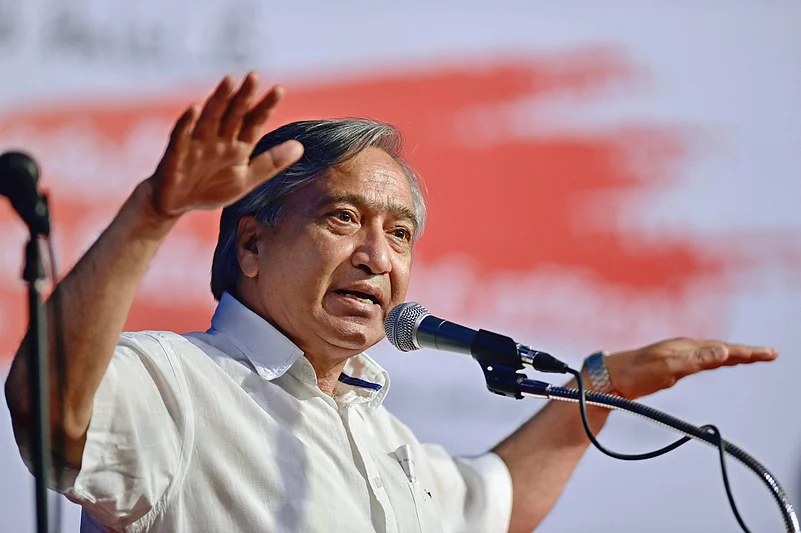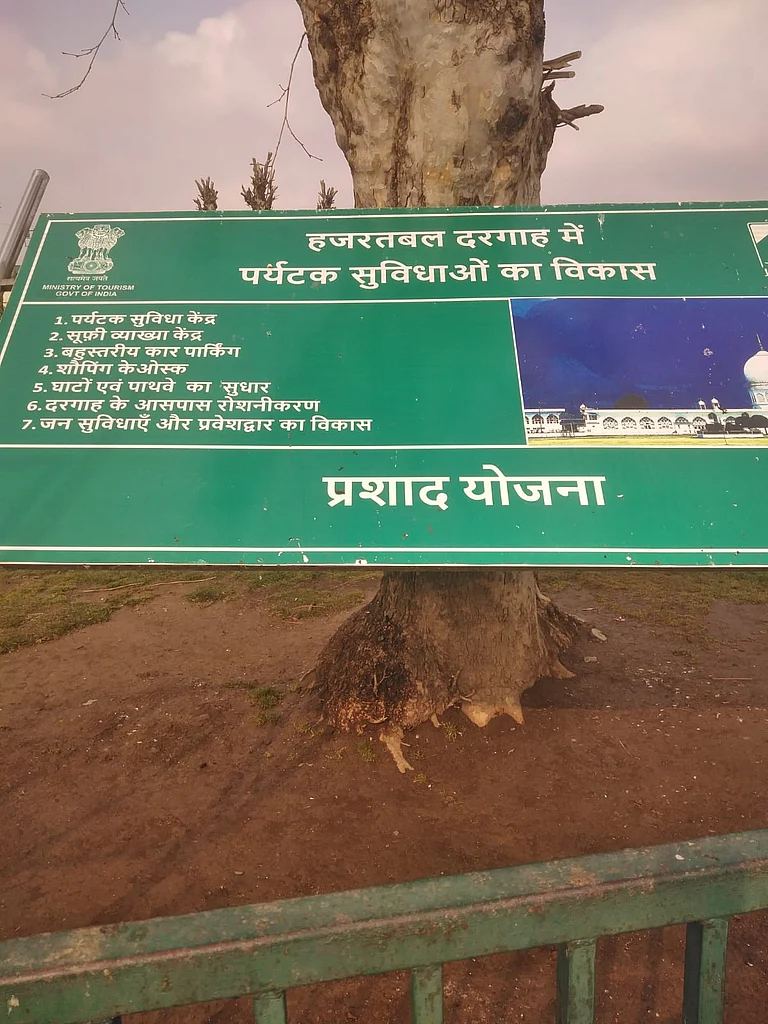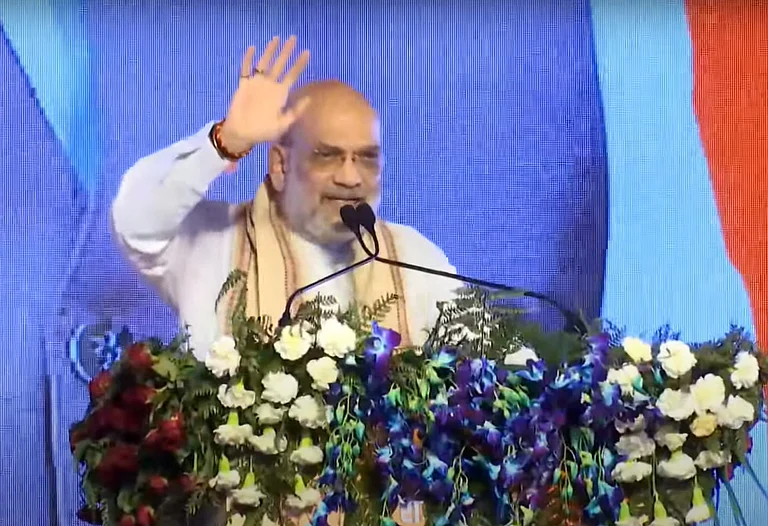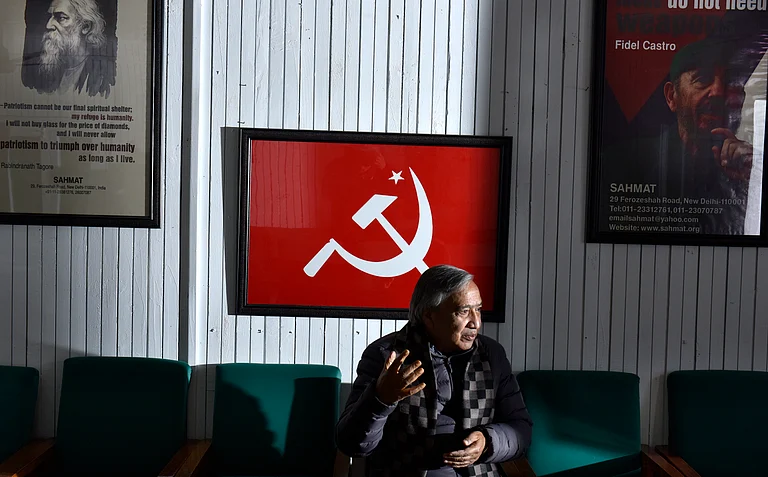Situated at a distance of nearly sixty-five kilometres to the south of Srinagar, Kulgam is a picturesque town in the Muslim-majority region of Jammu and Kashmir. Sitting on the banks of the Veshav River and dotted with paddy fields and apple orchards, Kulgam, unlike other regions, has been throwing political support behind the Communist Party of India-Marxist (CPI-M) since at least 1996.
It may be surprising to some that a town in Jammu and Kashmir is a CPI(M) stronghold, but it may not be difficult to understand given the history of local politics, and space for leftist politics in it. The Dogra Rule in Jammu and Kashmir was politically repressive, socially discriminatory and physically harsh. When a movement was launched against the Dogra Rule, from the outset it had undercurrents of class in it, aligning it with leftist ideology that focused on the empowerment of the victims of an autocratic system. The most important leader of twentieth-century Kashmir, Sheikh Muhammad Abdullah had been greatly influenced by socialist thinking, as reflected in his Naya Kashmir (New Kashmir) vision through which Abdullah carried out radical land reforms in 1950.
Once in power, however, Sheikh Abdullah was the first to unleash a crackdown against the communists in the region. Even BPL Bedi, a close confidante of Sheikh and the one who had compiled the Naya Kashmir document was not spared. This marginalisation of the members associated with the leftist ideology did not happen in a vacuum. There was a movement against the leftists in India in the late 1940s. Given the Sheikh’s closeness with then Prime Minister of India, Jawaharlal Nehru, he could not have said no to his friend, especially when it served his interests as well.
In the early 1950s, as Sheikh began to vacillate on his stand on the region’s accession to India and dithering its ratification in the state’s Constituent Assembly, leftists of Kashmir accused him of hobnobbing with the United States, the leader of capitalism. The view was amplified by the Sheikh’s meetings with American Democratic leader Adlai E. Stevenson. At the same time, Sheikh was battling with strong protests mostly stemming from the Jammu region. Various factors including his calculated risks of playing Pakistan card to get maximum political autonomy for Kashmir led to his fall and arrest in 1953.
On resuming power after signing the Indra-Sheikh Accord in 1975, Sheikh’s government lacked credibility among the masses to whom it had fed promises of self-determination for nearly two decades. The change and hobnobbing of Sheikh with New Delhi charged the leftist circles to criticise his approach. Mohammad Yousuf Tarigami who then was associated with the Revolutionary Students and Youth Federation, a local communist group, was part of such a campaign.
The support base of Jamaat-e-Islami has particularly been strong in Kashmir. When Zulfiqar Ali Bhutto was hanged in Pakistan in 1979, it led to riots in Kashmir in which the cadre and property of Jamaat-e-Islami were attacked for its support to Pakistan. Sheikh got a chance to settle scores for the party’s criticism of him in the past. He artfully used the situation to blame the CPI(M) for the riots. Along with many leftist leaders, the Abdullah administration booked Yousuf Tarigami also under the notorious Public Safety Act (PSA).
Although the leftist ideology has lost its traction in Jammu and Kashmir since then and the religious sentiments and vote bank politics have consolidated Muslims in Kashmir (under the Jamaat and other central left/right political parties) and Hindus in Jammu (under the Bharatiya Janata Party (BJP)/Rashtriya Swayamsevak Sangh (RSS)), Tarigami has still managed to carve out a space for politics that remains deeply influenced by leftist ideology in Kulgam. Known for his eloquence and speaking about common people’s miseries, Tarigami has carved a special niche among the people of the erstwhile state, and especially among the voters of his constituency. He has won assembly elections in 1996, 2002, 2008 and 2014.
Apart from speaking on the issues like political rights, Tarigami’s victory in the Kulgam constituency is a result of his focus on providing a network of blacktopped roads connecting different villages of his constituency to districts of Anantnag and Shopian to better water and healthcare facilities, availability of transformers and electric poles and swift addressal of people’s concerns in his constituency. Tarigami’s image helped the CPI(M) to also bag six seats in the District Development Council (DDC) elections of 2020, the first after the Jammu and Kashmir Reorganisation Act.
Reconciling religion with Marxism: Voters of Kulgam speak
Given the Muslim preponderance in the Kashmir region and the notion that Islam and the leftist ideology are in conflict, how has Tarigami’s leftist politics woos the people in Kulgam for the last almost three decades? The politics of providing governance and raising issues of political, social and economic rights do not necessarily divide religion and the leftist ideology. If anything these issues bring them close, in Kashmir more so given its turbulent nature of politics. And Tarigami has done this adroitly: He has focused on speaking for the rights of the Kashmiris and provided basic facilities to the voters of his constituency when other leaders have failed to do so.
Several voters that we spoke to attested to this point. They said that they do not vote for the CPI(M) party for its ideology but for its candidate’s ability to fulfil his promises by providing basic governance in the constituency. Whether that reflects the core values of the party or the commitments of its candidate, it does not concern us as long as it does not threaten our religious or cultural identity, they said. Some voters clearly articulated that they keep their religion out during voting for the CPI(M) by acting as a “rational voter” in the electoral governance system. The politics of Tarigami does not question their religion or identity so they keep their faith as a personal matter while voting for him. Their vote is for the party’s progressive politics and alleviating the common masses from the basic difficulties that they face on a daily basis. Apart from good governance provided by Tarigami in his constituency, other votes highlighted the development work undertaken by Tarigami in the constituency by effective use of MLA funds. Besides, Tarigami is seen as more accessible, honest and clean. A voter on the condition of anonymity shared that even some of the Jamaat members choose to vote for the CPI(M) in Kulgam by saying that their vote was not for the leftist ideology but for the people-centric politics of Tarigami.
Fears for the CPI(M)
On December 19, 2018, Jammu and Kashmir was put under the Presidential Rule. This was followed by the controversial abrogation of Article 370 by the BJP-led Union government in August 2019, whittling away some provisions meant for the state. Jammu and Kashmir was downgraded and divided into two Union Territories, Jammu and Kashmir and Ladakh. Although local DDC and Panchayat elections were conducted in 2020, the assembly polls have not been conducted despite having a Governor’s rule for more than six years.
In the last six months, on the Supreme Court’s direction, some signs have been given signalling that the Centre may possibly conduct Assembly elections in Jammu and Kashmir. What potentially comes as a big challenge to the CPI(M)’s historic success is the J&K’s delimitation commission’s notification in 2022 in which boundaries were redrawn for both Lok Sabha and Assembly constituencies. The delimitation has been heavily criticised by the mainstream political parties such as the People’s Democratic Party (PDP), National Conference (NC) and others who see it as the BJP’s hidden agenda for easy victory by gerrymandering various constituencies in Jammu and Kashmir.
The CPI(M) has not contested any Parliament elections – it has always relied on Assembly polls. In the newly drawn boundaries of the Kulgam constituency, many areas of the constituency like the villages of Danow, Makandapora, Bogund, Aarigatnoo, Chamgund, Malwan, and Banimulla among others have been cut off. These areas were a strong vote base for the party. After the amendment, Yaripora tehsil was added to Kulgam constituency where the CPI(M) has never fought any election. These changes, thus, emerge as a strong challenge for the CPI(M) to establish a base and prepare workers by appealing to the people of the area. The delimitation has affected the CPI(M) the most. The bringing of areas such as Yaripora which for the last four turns has given success to the PDP and the NC makes it difficult for the CPI(M) to win support of the voters of the area.
Tarigami will be fully aware of the implications of the delimitation of his constituency. At the same time, his past record implies that it is possible to focus on development, government and people’s rights issues by not necessarily invoking religion or challenging the religious identity of the people to win elections in Kashmir. Tarigami has done it thrice; he can do it a fourth time as well. Politics of governance, sustainable development and the rights of people are not necessarily against religion. If used artfully, they can woo new voters for Tarigami and set an example for other leaders of Jammu and Kashmir that politics can be done on other than religious issues.
Muneeb Yousuf and Nazir Ahmad Mir are researchers based in New Delhi.






















